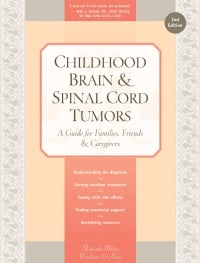Childhood Brain and Spinal Cord Tumors
Avoiding communicable diseases
The dangers of communicable diseases to immunosuppressed children are discussed in Chapter 12, Common Side Effects of Chemotherapy. The following information applies to children whose blood counts are very low, which only occurs with some types of treatment.
Parents of children with low blood counts need to work closely with the school to develop a chicken pox, whooping cough, measles, and flu outbreak plan if the school does not already have a communicable disease notification plan in place. The school should notify you immediately if your child has been exposed to chicken pox so she can receive the varicella zoster immune globulin (VZIG) injection within 72 hours of exposure.
Several methods can be used to ensure prompt reporting of outbreaks. Some parents notify all the classmates’ parents by letter to ask them for prompt reports of illness. If you have a good rapport with the teacher, you can ask the teacher to immediately report to you any cases of communicable disease.
My daughter’s preschool was very concerned and organized about the chicken pox reporting. They noted on each child’s folder whether he or she had already had chicken pox. They told each parent individually about the dangers to Katy, and then frequently reminded everyone in the monthly newsletters. The parents were absolutely great, and we always had time to keep her out of school until there were no new cases. With the help of these parents, teachers, our neighbors, and friends, Katy dodged exposure for almost 3 years. She caught chicken pox 7 months after treatment ended and had a perfectly normal case.

My son was diagnosed at age 14. He was starting ninth grade, the last year of junior high. He missed about a third of that year. He was able to keep up, thanks to some terrific teachers and a very cooperative administration, not to mention being a really motivated kid. He hated missing school and would go even when he didn’t feel very good, just to say he’d been to school that day, even if only for two periods. Our oncologists gave him the okay to be in school, saying that infection in kids his age was usually from bacteria they were already carrying around, so other kids were not a big threat, provided they weren’t sick.
Other parents enlist the help of the office staff who answer the phone calls from parents of absent children.
We asked the two ladies in the office to write down the illness of any child in Mrs. Williams’ class. That way the teacher could check daily and call me if any of the kids in her class were ill.
Table of Contents
All Guides- Introduction
- 1. Diagnosis
- 2. The Brain and Spinal Cord
- 3. Types of Tumors
- 4. Telling Your Child and Others
- 5. Choosing a Treatment
- 6. Coping with Procedures
- 7. Forming a Partnership with the Treatment Team
- 8. Hospitalization
- 9. Venous Catheters
- 10. Surgery
- 11. Chemotherapy
- 12. Common Side Effects of Chemotherapy
- 13. Radiation Therapy
- 14. Peripheral Blood Stem Cell Transplantation
- 15. Siblings
- 16. Family and Friends
- 17. Communication and Behavior
- 18. School
- 19. Sources of Support
- 20. Nutrition
- 21. Medical and Financial Record-keeping
- 22. End of Treatment and Beyond
- 23. Recurrence
- 24. Death and Bereavement
- 25. Looking Forward
- Appendix A. Blood Tests and What They Mean
- Appendix C. Books and Websites

